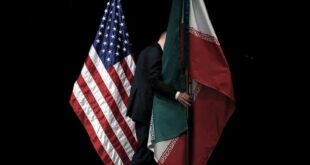 The Iranian government’s last-minute decision to ration monthly fuel allotments, as well as increase the price of gas, triggered protests and riots — a rarity in the Islamic republic — according to Iranian media reports.The oil ministry issued a statement at 9 p.m. Tuesday that the restrictions would go into effect at midnight.
The Iranian government’s last-minute decision to ration monthly fuel allotments, as well as increase the price of gas, triggered protests and riots — a rarity in the Islamic republic — according to Iranian media reports.The oil ministry issued a statement at 9 p.m. Tuesday that the restrictions would go into effect at midnight.
That prompted hundreds of thousands of car owners to line up for miles at gas stations late Tuesday and early Wednesday. Others took to the street in protest, burning at least 12 gas stations in Tehran and looting other businesses, according to Fars News Agency.
Under the order, most Iranians will be limited to about 26 U.S. gallons (100 liters) per month. The ministry also announced the price would be raised by more than 20 percent to 11 cents per liter (about 42 cents a gallon).
The riots took place across Iran’s major cities, including the holy city of Mashhad and Arak, where Iran’s heavy water plant is located, according to Iran’s official news agency, IRNA.
The riots were so intense that fire engines could not reach the burning gas stations, Fars reported, adding that the security forces and the Basij militia were trying to get the situation under control until 2 a.m. Wednesday.
Video showed streets jammed with cars waiting for gas. Some drivers returned to their cars with plastic cans, even a ceramic pitcher, filled with gasoline.
Fuel consumption has increased in recent years in Iran, which imports $4 billion worth of gas each year. Although it is the fourth largest crude oil producer in the world, Iran lacks the capacity to refine all of its petroleum into gasoline for consumption.
Iran’s government has considered imposing gas rations in the past, but the measures have been postponed amid debate. It has also debated how to increase gas prices so they are more in line with market value.
Iran is tightening its belt as the United Nations considers imposing additional economic sanctions on the Islamic republic for its failure to comply with U.N. demands to halt its uranium enrichment program. In addition, U.S. lawmakers are considering the Iran Counter-Proliferation Act of 2007 which calls for an end to foreign investment in Iran’s energy sector.
“We must reduce our vulnerability in foreign relations in order to safeguard our political independence by resolving our traffic problems,” parliament speaker Gholamali Haddad-Adel said.
Haddad-Adel, who is considered to be close to Iran’s Supreme Leader Ayatollah Khamenei, also said the measure was an attempt to combat gas smuggling out of Iran.
Hundreds of thousands of liters of cheap and subsidized gasoline is smuggled out of Iran to other Persian Gulf countries as well as to Pakistan, Afghanistan, Iraq , Turkey and Azerbaijan, costing Iran hundreds of millions of dollars each year.
Iran’s parliament Wednesday rejected an emergency measure that would have postponed the order to impose rations and increase prices, Fars reported. Parliament is scheduled to take its summer recess after Wednesday’s session, but it could reconvene to deal with the situation.
 Eurasia Press & News
Eurasia Press & News


